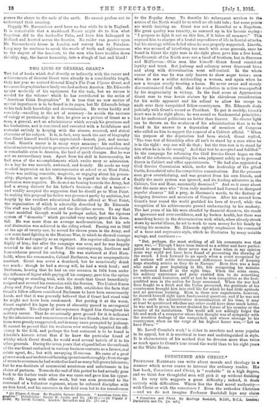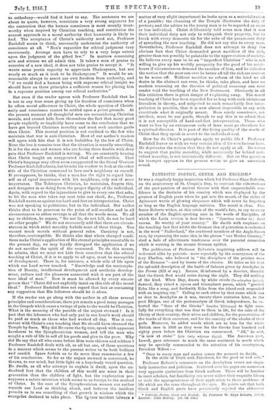CONSCIENCE AND CHRIST.*
PROFESSOR RASHDALL can write about morals and theology in a manner which never ceases to interest the ordinary reader. His last book, Conscience and Christ, is " readable " in a high degree, and we think few thoughtful men will pick it up without finishing it. Its very title suggests a great difficulty ; indeed, it deals entirely with difficulties. Where lies the final moral authority— with Christ or with the conscience ? Even the orthodox Christian
and we do not imagine Professor Rashdall lays any claim
• Conscience and Christ By Hastings Ilastidall, D.C.L. London.: Duckworth sun Co. i53. neta
to orthodoxy—would find it hard to say. The sentences we are about to quote, however, constitute a very strong argument for the contention that the human conscience is most morally trust- worthy when inspired by Christian teaching, and constitutes the nearest approach to a moral authority that humanity is likely to find. The acceptance of Christ's authority need not, Professor Rashdall seems to think, necessarily undermine the authority of conscience at all. "Men's capacities for ethical judgment vary enormously. Average men have to rely to a very large extent upon the judgment of the gifted few." In matters concerning arts and science we all admit this. It takes a man of genius to conceive of a new ideal, it does not take genius to accept it. "It wants some poetic capacity to appreciate Shakespeare, but not nearly so much as it took to be Shakespeare." It would be un- reasonable always to assert our own freedom from authority, and " if we could find a human being with supreme ethical insight we should have on these principles a sufficient reason for placing him in a supreme position among our ethical authorities."
But even if the reader agrees with Professor Rashdall that he Is not in any true sense giving up his freedom of conscience when he offers moral adherence to Christ, the whole question of Christi- anity and conscience cannot be settled upon a priori grounds. At the present moment all thoughtful men are reconsidering Christian morals, and cannot hide from themselves the fact that many good people explicitly or implicitly have come to the conclusion that we have got beyond Christian morality and must seek another guide than Christ. This mental position is not confined to the few who maintain that war is anti-Christian. Most of our author's readers will agree with him that it is not forbidden by the law of Christ. None the less it remains true that the situation is morally unsettling. It is for the men and women who are facing these doubts with deep pain that Professor Rashdall is writing. We are constantly hearing that Christ taught an exaggerated ideal of self-sacrifice. That Christ's language may often seem exaggerated to the literal Western Professor Rashdall admits, but he asks his readers to look at the other side of the Christian command to love one's neighbour as oneself. It presupposes, he thinks, that a man has the right to regard him- self as of equal importance with his neighbour, only not of more importance. The Tolstoyan Christian, he maintains, forgets this, and derogates in so doing from the proper dignity of the individual. Again, with regard to the injunctions to give to every one that asks, to let the man who takes our coat take our cloak, Ste., Professor Rashdall warns us against too hard-and-fast an interpretation. Christ was not speaking to politicians, but to the individual. Our author thinks that to be generous to the point of self-sacrifice and in all circumstances to abhor revenge is all that the words mean. We all say to children, he argues, "Do not lie, do not kill, do not be hard on other people." We do not necessarily add that there are circum- stances in which strict morality forbids none of these things. You cannot teach morals without general rules. Casuistry is not, therefore, contemptible. He thinks also that where changed condi- tions make Christ's application of His eternal principles unsuitable to the present day, we may loyally disregard the application if we do not sacrifice the spirit of the command. To do this means, he admits, that we must not hide from ourselves that the ethical teaching of Christ, if it is to apply to all ages, must be susceptible of development. There is, for instance, a whole side of life upon which our Lord never touched. "Knowledge and the contempla- tion of Beauty, intellectual development and aesthetic develop- ment, culture and the pleasures connected with it are part of the true ideal of man." Now it must be allowed by every sincere person that "Christ did not explicitly insist on this side of the moral ideal." Professor Rashdall does not regard that fact as containing any suggestion that His followers should let it alone.
If the reader can go along with the author in all these several principles and considerations, there yet remain a good many passages in the Gospels which cause a twinge of pain to the would-be Christian. What is the meaning of the parable of the unjust steward ? Is it just that the labourers who had only put in one hour's work should be paid as much as those who had worked all day. Was it con- sistent with Christ's own teaching that He should have cleansed the Temple by force. Why did He curse the fig-tree, speak with apparent harshness to the Syrophoenician woman, and tell the man who sought a rule of life to sell all his goods and give to the poor. Why did He say that all who came before Him were thieves and robbers ? Professor Rashdall deals with all, or all but one, of these questions in a manner which seems to the present writer to be both brilliant and candid. Space forbids us to do more than summarize a few of his conclusions. So far as the unjust steward is concerned, he throws, to our mind, but little light on a hopelessly vexed question. Ile dwells, as all who attempt to explain it dwell, upon the un- doubted fact that the children of this world are wiser in their generation than the children of light, but the explanation pre- supposes a satiric intention which seems to us foreign to the method of Christ. In the case of the Syrophoenician woman our author regards our Lord as thinking aloud, and believes the incident permits no to see something of that growth in wisdom which the evangelist declared to take place. The fig-tree incident (always a matter of very slight importance) he looks upon as a materialization of a parable; the cleansing of the Temple illustrates the duty of protest; and the advice to the young man is to be regarded as more or less individual. Christ deliberately told some men that it was their individual duty not only to relinquish their property, but to break with every domestic tie for the sake of the paramount duty of spreading the new teaching. He did not say this to every man. Nevertheless, Professor Rashdall does not attempt to deny the obvious fact that Christ demanded great sacrifices of the rich, greater than can possibly be palatable to the upper section of society. He believes every man to be an "imperfect Christian" who is not willing to give up his worldly prosperity for the good of his neigh- bours if circumstances demand the sacrifice of him, and he ridicules the notion that the poor can over be better off till the rich are content to be worse off. Without sacrifice no reform of the kind we all desire in the abstract can ever, he thinks, take place, and here no modern reasoning on the theories of political economy can ever render void the teaching of the New Testament. Obviously in all this criticism there is great danger of explaining away. The moral teaching of Christ has been regarded for so long with such idolatrous literalism in theory, and subjected to such remarkably free inter- prctation in practice, that it is now almost impossible to say with exactitude what it originally meant. Here surely conscience, not intellect, must be our guide, though to say this is to admit that it is not susceptible of hard-and-fast interpretation. Those who want to live by an extraneous code of laws must go elsewhere for a spiritual director. It is part of the living quality of the words of Christ that they speak in secret to the individual soul.
How far do Christ's principles apply to public life ? Professor Rashdall leaves us with no very certain idea of his conclusions here. He deprecates the notion that they do not apply at all. He seems to suggest that public morality, while necessarily far behind indi- vidual morality, is not intrinsically different. But on this question his trumpet appears to the present writer to give an uncertain sound.











































 Previous page
Previous page